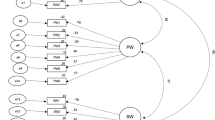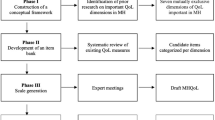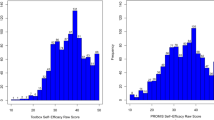Abstract
This paper describes the development and preliminary validation of the Multidimensional Health Profile–Health Functioning Index (MHP-H), a 69-item self-report instrument designed to assess a variety of behaviors, perceptions, attitudes, and beliefs presumed to influence health status and the pursuit of lay and professional health care. The MHP-H briefly measures adult health history, health habits, health care utilization, health beliefs and attitudes, and response to illness (help-seeking behaviors). A national sample of adults (N = 673) was assessed, comprising 3 age groupings (18–32, 33–50, and 51–89) crossed with gender and then further subdivided into several subsamples for purposes of reliability and validity assessment. In addition, a group of spouse “key informants’’ was also recruited. Preliminary validation of single-item indicators as well as confirmatory factor analyses of multi-item scales was achieved. The present findings support the psychometric and practical utility of the MHP-H and warrant its use by health psychologists in a variety of research and applied settings.
Similar content being viewed by others
References
Adler, N. E., & Matthews, K. A. (1994). Health psychology: Why do some people get sick and some stay well? Annual Review of Psychology, 45, 229–259.
Anderson, J. A. D. (Ed.). (1979). Self-medication. Baltimore: University Park Press.
Bandura, A. (1997). Self-efficacy: The exercise of control. New York: Freeman.
Bandura, A. (2004). Health promotion by social cognitive means. Health Education and Behavior, 31, 143–164.
Barsky, A. J., Cleary, P. D., Coeytaus, R. R., & Ruskin, J. N. (1995). The clinical course of palpitations in medical outpatients. Archives of Internal Medicine, 155, 1782–1788.
Barsky, A. J., Ettner, S. L., Horsky, J., & Bates, D. W. (2001). Resource utilization of patients with hypochondriacal health anxiety and somatization. Medical Care, 39, 705–715.
Bellg, A. J. (2003). Maintenance of health behavior change in preventive cardiology: Internalization and self-regulation of new behaviors. Behavior Modification, 27, 103–131.
Benedetto, M. C., Kerns, R. D., Rosenberg, R., Burg, M. M., & Westgate, K. (1998). Health risk behaviors and their relationships to health care utilization among veterans receiving primary medical care. Journal of Clinical Psychology in Medical Setting, 5, 441–447.
Bowling, A., & Grundy, E. (1998). The association between social networks and mortality in later life. Reviews in Clinical Gerontology, 8, 353–361.
Breslow, L. (1983). The potential of health promotion. In D. Mechanic (Ed.), Handbook of health, health care, and the health professions (pp. 50–66). New York: Free Press.
Buss, A. H., & Plomin, R. (1986). The EAS approach to temperament. In R. Plomin & J. Dunn (Eds.), The study of temperament: Changes, continuities, and challenges (pp. 67–79). Hillsdale, NJ: Erlbaum.
Cohen, S., & Syme, S. L. (Eds.).(1985). Social support and health. San Francisco: Academic Press.
Conner, M., Norman, P., & Bell, R. (2002). The theory of planned behavior and healthy eating. Health Psychology, 21, 194–201.
Costa, P. T., Jr., & McCrae, R. R. (1992). Revised NEO Personality Inventory (NEO PI-R) and NEO Five-Factor Inventory (NEO-FFI): Professional manual. Odessa, FL: Psychological Assessment Resources.
Curry, S. J., Ludman, E. J., Grothaus, L. C., Donovan, D., & Kim, E. (2003). A randomized trial of a brief primary-care-based intervention for reducing at-risk drinking practices. Health Psychology, 22, 156–165.
Davies, A. R. & Ware, J. E. (1981). Measuring health perceptions in the health insurance experiment. Santa Monica, CA: Rand Corporation.
Fisher, W. A., Fisher, J. D., & Rye, B. J. (1995). Understanding and promoting AIDS-preventive behavior: Insights from the theory of reasoned action. Health Psychology, 14, 255–264.
Ford, D. H. (1987). Humans as self-constructing living systems: A developmental perspective on behavior and personality. Hillsdale, NJ: Erlbaum.
Friedman, R., Sobel, D., Myers, P., Caudill, M., & Benson, H. (1995). Behavioral medicine, clinical health psychology, and cost offset. Health Psychology, 14, 509–518.
Gochman, D. S. (Ed.).(1997). Handbook of health behavior research. Vol. 1: Personal and social determinants. New York: Plenum.
Holroyd, K., & Creer, T. L. (Eds.).(1986). Self-management of chronic disease. Orlando, FL: Academic Press.
Institute of Medicine. (1997). Managing managed care: Quality improvement in behavioral health.Washington, DC: National Academy Press.
Jyvasjarvi, S., Joukamaa, M., Vaisanen, E., Larivaara, P., Kivela, S.-L., & Keinanen-Kiukaanniemi, S. (2001). Somatizing frequent attenders in primary health care. Journal of Psychosomatic Research, 50, 185–192.
Karoly, P. (1991). Self-management in health care and illness prevention. In C. R. Snyder & D. R. Forsyth (Eds.), Handbook of social and clinical psychology: The health perspective (pp. 579–606). New York: Pergamon.
Karoly, P. (1993). Mechanisms of self-regulation: A systems view. Annual Review of Psychology, 44, 23–52.
Karoly, P. (1998). Expanding the conceptual range of health self-regulation research: A commentary. Psychology and Health, 13, 741–746.
Karoly, P., & Ruehlman, L. S. (1995). Goal cognition and its clinical implications: Development and preliminary validation of four motivational assessment instruments. Assessment, 2, 113–129.
Kirmayer, L. J., & Robbins, J. M. (1991). Three forms of somatization in primary care: Prevalence, co-occurrence, and sociodemographic characteristics. Journal of Nervous and Mental Disease, 179, 647–655.
Levin, L. S., Katz, A. H., & Holst, E. (1976). Self-care: Lay initiatives in health. New York: Prodist.
Machlin, S. R., Valluzzi, J. L., Chevarley, F. M., & Thorpe, J. M. (2001). Measuring ambulatoryhealth care use in the United States: A comparison of 1996 estimates across four federal surveys. Journal of Economic and Social Measurement, 27, 57–69.
Martin, J. E., & Carlson, C. R. (1988). Spiritual dimensions of health psychology. In W. R. Miller & J. E. Martin (Eds.), Behavior therapy and religion (pp. 57–110). Newbury Park, CA: Sage.
Neumark-Sztainer, D., Wall, M. M., Story, M., & Perry, C. L. (2003). Correlates of unhealthy weight-control behaviors among adolescents: Implications for prevention programs. Health Psychology, 22, 88–98.
Olfson, M., Gibert, T., Weisman, M., Blackow, R. S., & Broadbent, W. E. (1995). Recognition of emotional distress in physically healthy primary care patients who perceive poor physical health. General and Hospital Psychiatry, 17, 173–180.
Paulus, D. L. (1991). BIDR manual for version 6. Vancouver: University of British Columbia, Department of Psychology.
Paulus, D. L., & Reid, D. B. (1991). Enhancement and denial in socially desirable responding. Journal of Personality and Social Psychology, 60, 307–317.
Pilowski, I. (1967). Dimensions of hypochondriasis. British Journal of Psychiatry, 113, 89–93.
Rosen, J. C., & Solomon, L. J. (Eds.).(1985). Prevention in health psychology. Hanover, NH: University Press of New England.
Ruehlman, L. S., Lanyon, R. I., & Karoly, P. (1999). Development and validation of the Multi-dimensional Health Profile, Part I: Psychosocial functioning. Psychological Assessment, 11, 166–176.
Sayar, K., Kirmayer, L. J., & Taillefer, S. S. (2003). Predictors of somatic symptoms in depressive disorder. General Hospital Psychiatry, 25, 108–114.
Senecal, C., Nouwen, A., & White, D. (2000). Motivation and dietary self-care in adults with diabetes: Are self-efficacy and autonomous self-regulation complementary or competing constructs? Health Psychology, 19, 452–457.
Taylor, S. E. (1989). Positive illusions: Creative self-deception and the healthy mind. New York: Basic Books.
Taylor, S. E. (2003). Health psychology (5th ed). Boston: McGraw-Hill.
U.S. Department of Health and Human Services (2000). Healthy people 2010 (2nd ed). Washington, DC: U.S. Government Printing Office.
VanderVoort, D. (1999). Quality of social support in mental and physical health. Current Psychology: Developmental, Learning, Personality, 18, 205–222.
Von Korff, M., Gruman, J., Schaefer, J., Curry, S. J., & Wagner, E. H. (1997). Collaborative management of chronic illness. Annals of Internal Medicine, 127, 1097–1102.
Weinstein, N. D. (Ed.).(1987). Taking care: Understanding and encouraging self-protective behavior. New York: Cambridge University Press.
Winett, R. A., King, A. C., & Altman, D. G. (1989). Health psychology and public health: An integrative approach. New York: Pergamon.
Woodman, C. L., Been, K., Noyes, R., Jr., Moss, C., Fagerholm, R., Yagla, S. J., (1998). Relationship between irritable bowel syndrome and psychiatric illness: A family study. Psychosomatics, 39, 45–54.
Author information
Authors and Affiliations
Corresponding author
Rights and permissions
About this article
Cite this article
Karoly, P., Ruehlman, L.S. & Lanyon, R.I. The Assessment of Adult Health Care Orientations: Development and Preliminary Validation of the Multidimensional Health Profile–Health Functioning Index (MHP-H) in a National Sample. J Clin Psychol Med Settings 12, 79–91 (2005). https://doi.org/10.1007/s10880-005-0915-y
Issue Date:
DOI: https://doi.org/10.1007/s10880-005-0915-y




